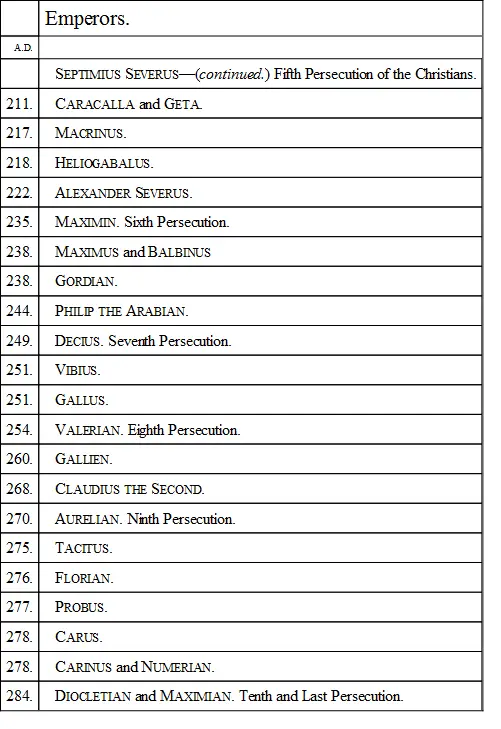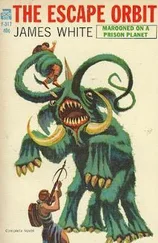James White - The Eighteen Christian Centuries
Здесь есть возможность читать онлайн «James White - The Eighteen Christian Centuries» — ознакомительный отрывок электронной книги совершенно бесплатно, а после прочтения отрывка купить полную версию. В некоторых случаях можно слушать аудио, скачать через торрент в формате fb2 и присутствует краткое содержание. Жанр: foreign_prose, История, foreign_edu, foreign_antique, на английском языке. Описание произведения, (предисловие) а так же отзывы посетителей доступны на портале библиотеки ЛибКат.
- Название:The Eighteen Christian Centuries
- Автор:
- Жанр:
- Год:неизвестен
- ISBN:нет данных
- Рейтинг книги:4 / 5. Голосов: 1
-
Избранное:Добавить в избранное
- Отзывы:
-
Ваша оценка:
- 80
- 1
- 2
- 3
- 4
- 5
The Eighteen Christian Centuries: краткое содержание, описание и аннотация
Предлагаем к чтению аннотацию, описание, краткое содержание или предисловие (зависит от того, что написал сам автор книги «The Eighteen Christian Centuries»). Если вы не нашли необходимую информацию о книге — напишите в комментариях, мы постараемся отыскать её.
The Eighteen Christian Centuries — читать онлайн ознакомительный отрывок
Ниже представлен текст книги, разбитый по страницам. Система сохранения места последней прочитанной страницы, позволяет с удобством читать онлайн бесплатно книгу «The Eighteen Christian Centuries», без необходимости каждый раз заново искать на чём Вы остановились. Поставьте закладку, и сможете в любой момент перейти на страницу, на которой закончили чтение.
Интервал:
Закладка:
|A.D. 181.|
With the death of the excellent Marcus Aurelius the golden age came to a close. Commodus sat on the throne, and renewed the wildest atrocities of the previous century. Nero was not more cruel—Domitian was not so reckless of human life. He fought in the arena against weakly-armed adversaries, and slew them without remorse. He polluted the whole city with blood, and made money by selling permissions to murder. Thirteen years exhausted the patience of the world, and a justifiable assassination put an end to his life. There was an old man of the name of Pertinax, originally a nickname derived from his obstinate or pertinacious disposition, who now made his appearance on the throne and perished in three months. It chanced that a certain rich man of the name of Didius was giving a supper the night of the murder to some friends. The dishes were rich, and the wine delicious. Inspired by the good cheer, the guests said, “Why don’t you buy the empire? The soldiers have proclaimed that they will give it to the highest bidder.” Didius knew the amount of his treasure, and was ambitious: he got up from table and hurried to the Prætorian camp. On the way he met the mutilated body of the murdered Pertinax, dragged through the streets with savage exultation. Nothing daunted, he arrived at the soldiers’ tents. Another had been before him—Sulpician, the father-in-law and friend of the late emperor. A bribe had been offered to each soldier, so large that they were about to conclude the bargain; but Didius bade many sesterces more. The greedy soldiery looked from one to the other, and shouted with delight, as each new advance was made. |A.D. 193.|At last Sulpician was silent, and Didius had purchased the Roman world at the price of upwards of £200 to each soldier of the Prætorian guard. He entered the palace in state, and concluded the supper, which had been interrupted at his own house, on the viands prepared for Pertinax. But the excitement of the auction-room was too pleasant to be left to the troops in Rome. Offers were made to the legions in all the provinces, and Didius was threatened on every side. Even the distant garrisons of Britain named a candidate for the throne; and Claudius Albinus assumed the imperial purple, and crossed over into Gaul. More irritated still, the army in Syria elected its general, Pescennius Niger, emperor, and he prepared to dispute the prize; but quietly, steadily, with stern face and unrelenting heart, advancing from province to province, keeping his forces in strict subjection, and laying claim to supreme authority by the mere strength of his indomitable will, came forward Septimius Severus, and both the pretenders saw that their fate was sealed. Illyria and Gaul recognised his title at once. Albinus was happy to accept from him the subordinate title of Cæsar, and to rule as his lieutenant. Didius, whose bargain turned out rather ill, besought him to be content with half the empire. Severus slew the messengers who brought this proposition, and advanced in grim silence. The Senate assembled, and, by way of a pleasant reception for the Illyrian chief, requested Didius to prepare for death. The executioners found him clinging to life with unmanly tenacity, and killed him when he had reigned but seventy days. One other competitor remained, the general of the Syrian army—the closest friend of Severus, but now separated from him by the great temptation of an empire in dispute. This was Niger, from whom an obstinate resistance was expected, as he was equally famous for his courage and his skill. But fortune was on the side of Severus. Niger was conquered after a short struggle, and his head presented to the victor. Was Albinus still to live, and approach so near the throne as to have the rank of Cæsar? Assassins were employed to murder him, but he escaped their assault. The treachery of Severus brought many supporters to his rival. The Roman armies were ranged in hostile camps. Severus again was fortunate, and Albinus, dashing towards him to engage in combat, was slain before his eyes. He watched his dying agonies for some time, and then forced his horse to trample on the corpse. A man of harsh, implacable nature—not so much cruel as impenetrable to human feelings, and perhaps forming a just estimate of the favourable effect upon his fortunes of a disposition so calm, and yet so relentless. The Prætorians found they had appointed their master, and put the sword into his hand. He used it without remorse. He terrified the boldest with his imperturbable stillness; he summoned the seditious soldiery to wait on him at his camp. They were to come without arms, without their military dress, almost like suppliants, certainly not like the ferocious libertines they had been when they had sold the empire at the highest price. “Whoever of you wishes to live,” said Severus, frowning coldly, “will depart from this, and never come within thirty leagues of Rome. Take their horses,” he added to the other troops who had surrounded the Prætorians, “take their accoutrements, and chase them out of my sight.” Did the Senate receive a milder treatment? On sending them the head of Albinus, he had written to the Conscript Fathers alarming them with the most dreadful threats. And now the time of execution had come. He made them an oration in praise of the proscriptions of Marius and Sylla, and forced them to deify the tyrant Commodus, who had hated them all his life. He then gave a signal to his train, and the streets ran with blood. All who had borne high office, all who were of distinguished birth, all who were famous for their wealth or popular with the citizens, were put to death. He crossed over to England and repressed a sedition there. His son Caracalla accompanied him, and commenced his career of warlike ardour and frightful ferocity, which can only be explained on the ground of his being mad. He tried even to murder his father, in open day, in the sight of the soldiers. He was stealing upon the old man, when a cry from the legion made him turn round. His inflexible eye fell upon Caracalla—the sword dropped from his unfilial hand—and dreadful anticipations of vengeance filled the assembly. The son was pardoned, but his accomplices, whether truly or falsely accused, perished by cruel deaths. At last the emperor felt his end approach. He summoned his sons Caracalla and Geta into his presence, recommended them to live in unity, and ended by the advice which has become the standing maxim of military despots, “Be generous to the soldiers, and trample on all beside.”
With this hideous incarnation of unpitying firmness on the throne—hopeless of the future, and with dangers accumulating on every side, the Second Century came to an end, leaving the amazing contrast between its miserable close and the long period of its prosperity by which it will be remembered in all succeeding time.
THIRD CENTURY

Clement of Alexandria, Dion Cassius, Origen, Cyprian, Plotinus, Longinus, Hippolitus Portuensis, Julius Africanus Celsus, Origen.
THE THIRD CENTURY
We are now in the twelfth year of the Third Century. Septimius Severus has died at York, and Caracalla is let loose like a famished tiger upon Rome. He invites his brother Geta to meet him to settle some family feud in the apartment of their mother, and stabs him in her arms. The rest of his reign is worthy of this beginning, and it would be fatiguing and perplexing to the memory to record his other acts. Fortunately it is not required; nor is it necessary to follow minutely the course of his successors. What we require is only a general view of the proceedings of this century, and that can be gained without wading through all the blood and horrors with which the throne of the world is surrounded. Conclusive evidence was obtained in this century that the organization of Roman government was defective in securing the first necessities of civilized life. When we talk of civilization, we are too apt to limit the meaning of the word to its mere embellishments, such as arts and sciences; but the true distinction between it and barbarism is, that the one presents a state of society under the protection of just and well-administered law, and the other is left to the chance government of brute force. There was now great wealth in Rome—great luxury—a high admiration of painting, poetry, and sculpture—much learning, and probably infinite refinement of manners and address. But it was not a civilized state. Life was of no value—property was not secure. A series of madmen seized supreme authority, and overthrew all the distinctions between right and wrong. Murder was legalized, and rapine openly encouraged. It is a sort of satisfaction to perceive that few of those atrocious malefactors escaped altogether the punishment of their crimes. If Caracalla slays his brother and orders a peaceable province to be destroyed, there is a Macrinus at hand to put the monster to death. |A.D. 218.|But Macrinus, relying on the goodness of his intentions, neglects the soldiery, and is supplanted by a boy of seventeen—so handsome that he won the admiration of the rudest of the legionaries, and so gentle and captivating in his manners that he strengthened the effect his beauty had produced. He was priest of the Temple of the Sun at Emesa in Phœnicia; and by the arts of his grandmother, who was sister to one of the former empresses, and the report that she cunningly spread abroad that he was the son of their favourite Caracalla, the affection of the dissolute soldiery knew no bounds. Macrinus was soon slaughtered, and the long-haired priest of Baal seated on the throne of the Cæsars, under the name of Heliogabalus. As might be expected, the sudden alteration in his fortunes was fatal to his character. All the excesses of his predecessors were surpassed. His extravagance rapidly exhausted the resources of the empire. His floors were spread with gold-dust. His dresses, jewels, and golden ornaments were never worn twice, but went to his slaves and parasites. He created his grandmother a member of the Senate, with rank next after the consuls; and established a rival Senate, composed of ladies, presided over by his mother. Their jurisdiction was not very hurtful to the State, for it only extended to dresses and precedence of ranks, and the etiquette to be observed in visiting each other. But the evil dispositions of the emperor were shown in other ways. He had a cousin of the name of Alexander, and entertained an unbounded jealousy of his popularity with the soldiers. Attempts at poison and direct assassination were resorted to in vain. The public sympathy began to rise in his favour. The Prætorians formally took him under their protection; and when Heliogabalus, reckless of their menaces, again attempted the life of Alexander, the troops revolted, proclaimed death to the infatuated emperor, and slew him and his mother at the same time.
Читать дальшеИнтервал:
Закладка:
Похожие книги на «The Eighteen Christian Centuries»
Представляем Вашему вниманию похожие книги на «The Eighteen Christian Centuries» списком для выбора. Мы отобрали схожую по названию и смыслу литературу в надежде предоставить читателям больше вариантов отыскать новые, интересные, ещё непрочитанные произведения.
Обсуждение, отзывы о книге «The Eighteen Christian Centuries» и просто собственные мнения читателей. Оставьте ваши комментарии, напишите, что Вы думаете о произведении, его смысле или главных героях. Укажите что конкретно понравилось, а что нет, и почему Вы так считаете.












